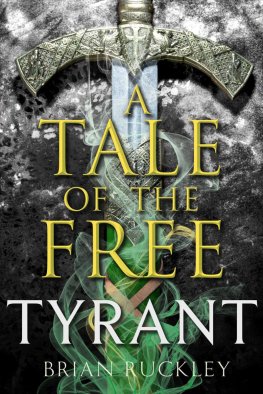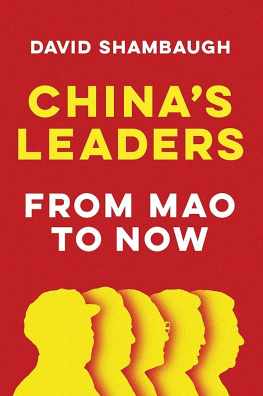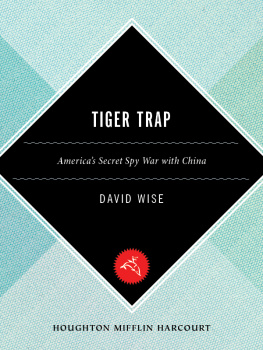TIGER, TYRANT, BANDIT, BUSINESSMAN
Echoes of Counterrevolution from New China
Brian DeMare
Stanford University Press
Stanford, California
Stanford University Press
Stanford, California
2022 by Brian James DeMare. All rights reserved.
No part of this book may be reproduced or transmitted in any form or by any means, electronic or mechanical, including photocopying and recording, or in any information storage or retrieval system without the prior written permission of Stanford University Press.
Printed in the United States of America on acid-free, archival-quality paper
Library of Congress Cataloging-in-Publication Data
Names: DeMare, Brian James, author.
Title: Tiger, tyrant, bandit, businessman : echoes of counterrevolution from New China / Brian DeMare.
Description: Stanford, California : Stanford University Press, 2022. | Includes bibliographical references and index.
Identifiers: LCCN 2021051939 (print) | LCCN 2021051940 (ebook) | ISBN 9781503632363 (cloth) | ISBN 9781503632516 (ebook)
Subjects: LCSH: CounterrevolutionariesChinaPoyang XianHistory. | Trials (Political crimes and offenses)ChinaPoyang XianHistory. | Poyang Xian (China)History20th century. | ChinaHistory19491976.
Classification: LCC DS797.57.P683 D46 2022 (print) | LCC DS797.57.P683 (ebook) | DDC 951.05dc23/eng/20211109
LC record available at https://lccn.loc.gov/2021051939
LC ebook record available at https://lccn.loc.gov/2021051940
Cover design: Kevin Barrett Kane
For Nina. For Miles.
CONTENTS
A FEW WORDS BEFORE WE BEGIN
On a deadly summer night in 1949 Big Tiger led an assassination squad through the mountains of northern Jiangxi, a landlocked province in eastern China. For the crimes he and his saber committed that evening, he became one of the first to be charged by the Chinese Communist Party as an evil tyrant. This was a criminal label that the party gave to villagers accused of abusing and exploiting their neighbors. A conviction would make Big Tiger a counterrevolutionary, worthy of execution for attempting to forestall the liberation of the masses. Many would follow his long and winding path through the justice system of the Peoples Republic of China, but the voices of the rural folk accused of counterrevolution are largely absent from the historical record. Thats no longer the case for Big Tiger, whose tale of crime and punishment is detailed in this books second casefile.
There are other uncommon voices in this book. Readers will hear from Golden Cao, a bandit who came down from a mountainous hideout to spill his guts to the Communists. And from Merchant Zha, a hapless businessman, tried for spying on the behalf of a feared counterrevolutionary army. To these voices this book adds those of farmers, administrators, secret society members, and a Confucian gentleman with a bum left foot. It seems prudent to admit from the start that these voices didnt come to me unfiltered. They arrived as textual echoes, bouncing through four criminal casefiles, each filled with reports and confessions filed away by bureaucrats working at the lowest levels of the Chinese state.
For over 2,000 years the county represented the furthest reaches of government administration in China. Well into the twentieth century, the formal power of the state went no further than county-level bureaucrats. The documents generated by these local governments offer some of the closest access to rural China at what historians call the grassroots: the lower reaches of society, populated by the ordinary folk who endured decades of revolutionary upheavals and state building programs. This book is based on a particularly unique set of documents: four criminal casefiles, all produced by county-level security officers in the first years of the Peoples Republic. Each casefile concerns an investigation into counterrevolution in Poyang, an overwhelmingly rural county in northern Jiangxi. This book, however, is not just about counterrevolution. The rare voices found in this book reveal much about the countryside and what the revolution meant for all rural citizens. Because the documents used to create this book offer an unflinching perspective on Chinas recent past, readers should be warned that the following pages contain graphic descriptions of violence, often directly narrated by the accused.
I spent some time in the countryside around Poyang County in the summer of 2004. By the time I got to northern Jiangxi, the revolutionary furor of those early days seemed a long-forgotten memory.









